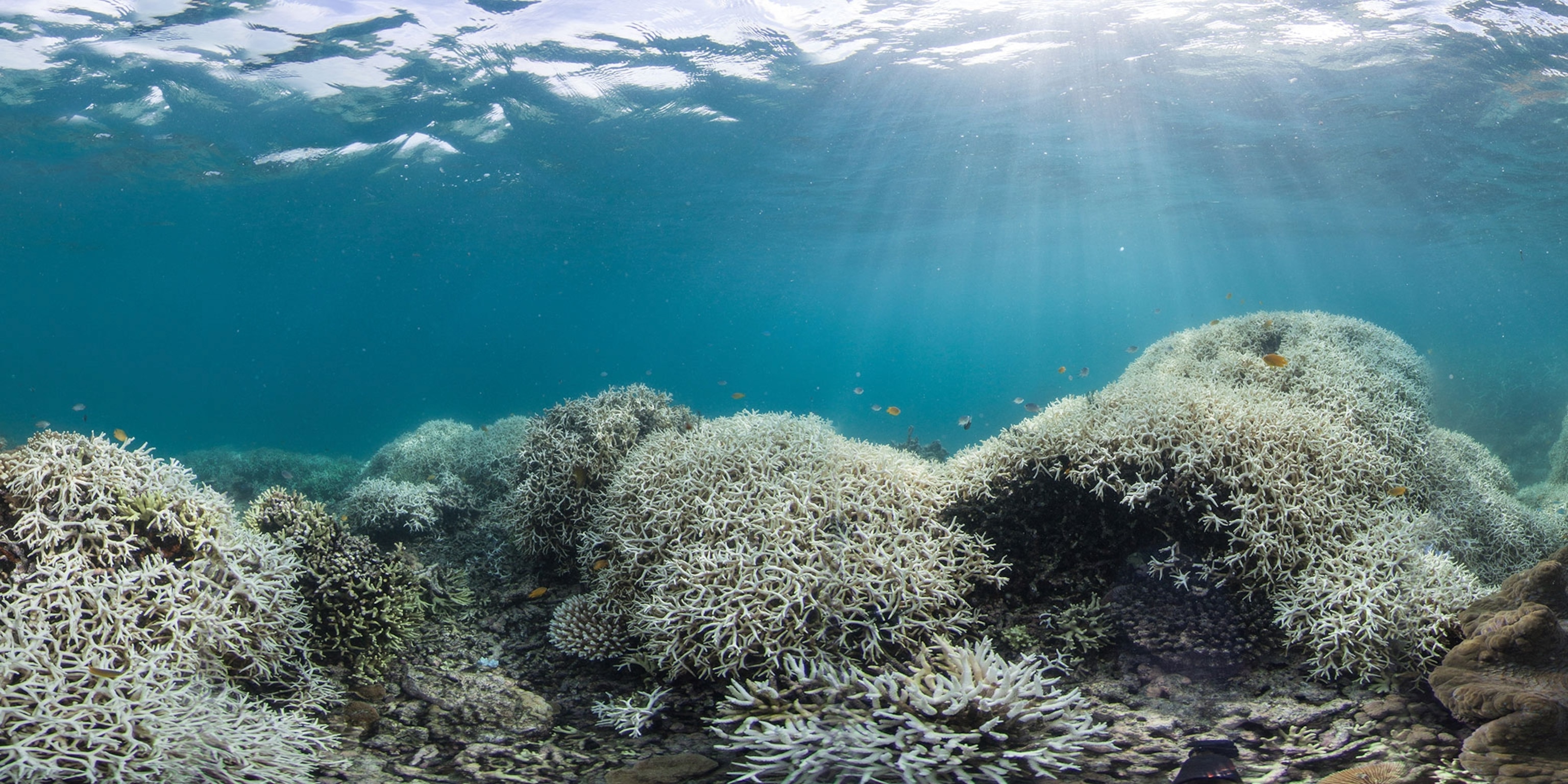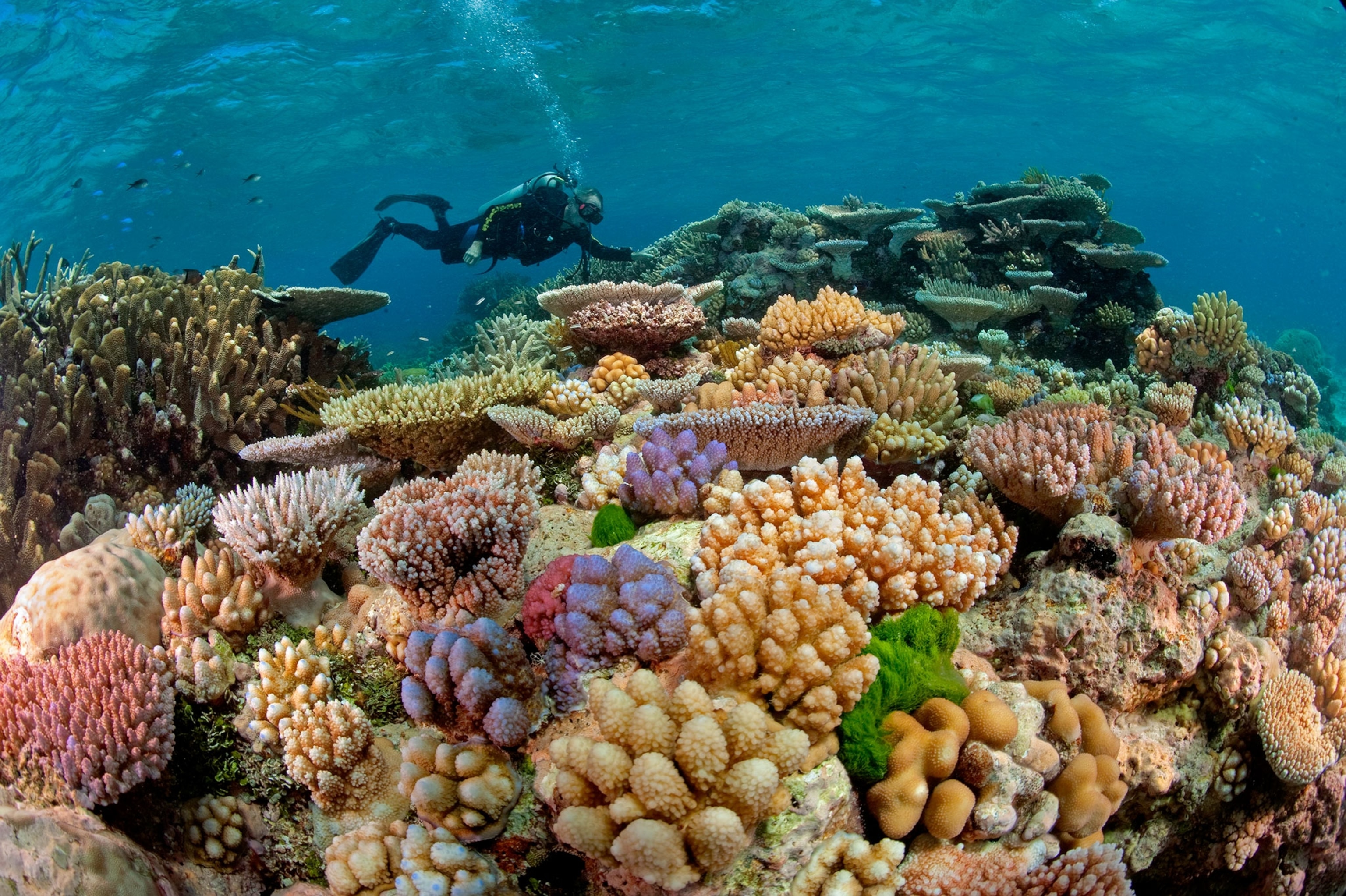
Warming Threatens the Great Barrier Reef Even More Than We Thought
The iconic reef depends on protective pulses of warm water to boost its heat tolerance. Climate change may eliminate these “practice runs.”
When waters get too hot, corals stress out and turn a ghostly white, and to survive, they must complete a marathon-like feat of endurance. Now, for the first time, new research reveals that a coral’s chance of surviving in Australia’s Great Barrier Reef depends on whether it encounters “practice runs” of gently warm water.
Climate change, however, is posed to eliminate these pulses of warmth, exposing the Great Barrier Reef—a necklace of 2,900 individual reefs strung along Australia’s northeast coast—to high temperatures with a lesser chance of preconditioning.
The effects could be devastating. If greenhouse gases continue at the current pace, the reef’s corals could be bleached to death by the 2050s. The reef is home to more than 1,500 species of fish, six of the world’s seven marine turtle species, and 30 species of whales and dolphins. What’s more, the UNESCO World Heritage site is a tourism powerhouse, supporting about 70,000 jobs and pumping more than six billion dollars into the Australian economy.
Although the research was conducted months ago, its publication in Science on Thursday coincides with the worst bleaching event ever to strike the Great Barrier Reef. Sparked by El Niño but abetted by climate change, the ongoing event has ravaged 75 percent of the reef’s northern half, in patterns consistent with the study’s predictions.
“This paper is really about the vagaries of the local weather,” says Terry Hughes, head of Australia’s National Coral Bleaching Task Force. “That’s exactly what happened on the Barrier Reef.”
Warming Isn’t One-Size-Fits-All
Like all reefs, the Great Barrier Reef has long been walking a razor’s edge. When temperatures reach just 2 degrees Celsius above average monthly highs, corals’ algae—their crucial food source—short-circuits, rendering it toxic and forcing the corals to expel it. Kicking out the algae turns the coral bone white and potentially sets it on a path to starvation, a phenomenon called bleaching.
Coral biologists have long known that temperature spikes cause bleaching, but since bleaching death tolls are hardly uniform across the Great Barrier Reef, they suspected that the days preceding a temperature spike offer some corals the opportunity to prepare. They just weren’t sure how.
“We’ve all known that something like that must be going on, [but] we didn’t really have a good handle on it, or know what was happening,” says Stephen Palumbi, a Stanford University marine ecologist who studies coral reef heat tolerance. He was not involved in the new study.
To find out, scientists led by Tracy Ainsworth, a researcher at the ARC Centre of Excellence for Coral Reef Studies in Townsville, Australia, analyzed 27 years’ worth of satellite weather data from the Great Barrier Reef, in combination with measurements of regional winds and ocean currents. They found that the temperature spikes capable of bleaching the Great Barrier Reef’s corals came in not one, but three different varieties.
Some regions of the reef experienced temperature spikes in single, startling bursts, while others yoyoed between average and extreme temperatures. But across much of the Great Barrier Reef, the researchers saw that corals often were exposed to “protective” pulses of warm water.
These summer waters, which bathed the corals several days before bleaching events, had above-average temperatures, but weren’t hot enough to bleach the corals, seemingly conditioning the corals for the eventual spike.
After subjecting corals to similar temperature cycles in the lab, Ainsworth found that the protective pulses lowered coral mortality on a cellular and genetic level, giving those corals a huge leg up in the race to survive.
“I like the runner analogy,” says Ainsworth. “For those that can do a practice run first and do a little bit of training, they can handle it.”
Humankind Faces a Choice
The researchers are now finding that bleaching, sparked by this year’s El Niño and worsened by global warming, has overwhelmed the reef—even in areas that had steeled themselves to the impact after earlier “practice runs.”
Scott Heron of the National Oceanic and Atmospheric Administration, one of the study’s coauthors, estimates that around three-quarters of the past bleaching events on the reef have had protective pulses. “This event could have been even worse,” he says. “We’re talking the order of twice as bad.”

What’s more, Hughes points out that a mere fluke of the weather kept the bleaching confined to the Great Barrier Reef’s northern half, thanks to remnants of a cyclone that cooled the reef’s southern waters.
“If you think about that, it says we’re very close to a tipping point, where every time we get an El Niño event, there’s a very high chance that we’ll get bleaching,” says Hughes, who wasn’t involved with the research but helped secure its funding. “It’s taken us to a much more risky place.”
And as the new study starkly shows, the future is bound to be even riskier for the Great Barrier Reef.
If emissions continue growing at their present rate, the researchers’ models show that protective pulses essentially will cease when baseline ocean temperatures are 0.5 degrees Celsius warmer than today’s—a target that is likely to be hit in the next 40 years. At the same time, single bleaching events without the practice runs would increase dramatically.
The one-two punch potentially could kill off an average individual reef in the Great Barrier Reef as early as the 2050s, though the scientists caution that warming’s effects will vary greatly from location to location.
Nevertheless, the study also suggests that humankind still has a say in the reefs’ survival. In models simulating immediate and rapid emissions reductions, the average reef within the Great Barrier Reef has decent survival odds, according to the research. The models indicate some level of die-off, and as Heron and Ainsworth note, current emissions already lock in some future warming.
But according to David Wachenfeld, the Great Barrier Reef Marine Park Authority’s director of reef recovery, hesitating to act in the face of ecological disaster is not a tenable option.
“Say you fall asleep in your car on the highway, and you wake up and find yourself driving at 60, 70 miles an hour into a brick wall,” says Wachenfeld. “You wouldn’t think, ‘Hmm, how hard do I have to stamp on the brake pedal before I hit the wall?’